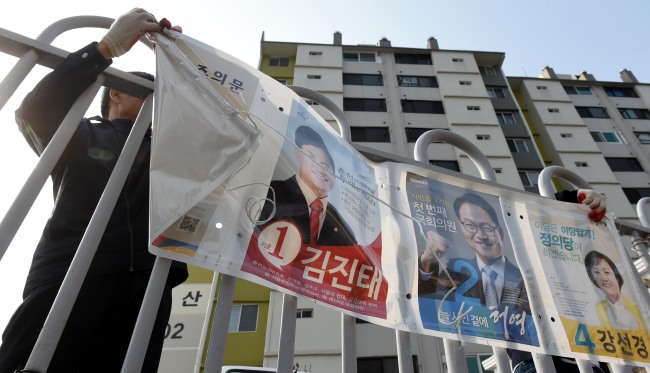The local polling industry is in a sense of crisis after failing to forecast many of the outcomes of Wednesday’s parliamentary election, with questions growing over the validity of opinion surveys.
In the election, the opposition bloc made an unexpectedly strong showing, defying the expectations of local pollsters and analysts, who thought that the ruling conservative party would easily regain the majority.
Saenuri took 122 seats in the 300-member National Assembly, while The Minjoo Party of Korea won 123 seats and the new People’s Party secured 38, according to the National Election Commission.
 |
| City officials in Chuncheon, Gangwon Province, on Thursday take down the posters for Wednesday‘s general election. / Yonhap |
In Seoul’s heavyweight match in Jongno district, for example, polls widely predicted a victory for former Seoul Mayor Oh Se-hoon. But five-term lawmaker Chung Sye-kyun of the Minjoo Party defeated Oh by nearly 13 percentage points.
In the highly contested Yongsan district in central Seoul, polls suggested that political newcomer Hwang Chun-ja of Saenuri Party would beat Chin Young, a former health minister and defector from the ruling party. In the end, Chin finished ahead of Hwang by 3 percentage points.
In Seoul’s Nowon-A district, polls put Ko Yong-jin of the Minjoo Party at least 15 percentage points behind, but he ended up crushing his rival Lee No-keun of the Saenuri Parity by nearly 3 percentage points.
In Busan, polls predicted that the ruling Saenuri party would lose only in two constituencies. But independent and Minjoo Party candidates scored six victories.
In Suncheon in South Jeolla Province, Rep. Lee Jeong-hyun of the governing party saw an unexpected upset over his liberal contender Roh Kwan-kyu, in contrast to opinion polls.
Electorates remain skeptical of opinion polls, too, raising questions about the credibility of pollsters.
Lim Jae-young, 27, who voted in the competitive Nowon-A constituency, told The Korea Herald that he received same phone calls asking about his intentions in the election on five occasions.
“I think that opinion polls can give distorted results because it is based on selective sampling,” he said. “The polls did not impact my vote as they were widely seen among my peers as not trustworthy.”
According to a survey by Realmeter on 1,054 eligible voters in early April, one in two Koreans did not trust the opinion polls. Nearly 52 percent of them thought that the polls leaned in favor of the governing party, while only 20.4 percent saw them as fair.
Experts pointed to unrepresentative poll samples and heavy reliance on landline phones when conducting surveys as reasons for pollsters’ irrelevance.
“The method (of using landline phones) is not wrong, but random survey on those likely to stay at home and pick up a phone, for instance, could lead to results in favor of conservative bloc.” said Kim Myung-joon, director of Global Research.
While all general election polls are carried out through landline phones in Korea, pollsters are finding it increasingly difficult to widen their range of respondents due to growing usage of mobile phones. Respondents are randomly chosen according to age and gender.
Young voters, who are not usually available to answer the telephone at home, are thought to be under-represented in opinion polls.
Lee Taek-soo, head of local pollster Realmeter, admitted that it is no longer possible to gauge voter sentiment through the current method. He called for a need to curb regulations and revise relevant laws to boost fairness in polls.
The NEC has recently slapped penalties on some pollsters for reflecting respondents’ past voting tendencies in analyzing the results, which according to Lee is an effective way of combing out the biased pool of respondents.
The election law also bans pollsters from surveying electorates through mobile phones.
“The election law should also be revised to expand pollsters’ access to mobile phone numbers of electorates in polls,” he said. “The NEC should also scrap the period in which pollsters cannot reveal their survey results so that the public’ rights to know can be properly upheld.”
By Ock Hyun-ju (laeticia.ock@heraldorp.com)

